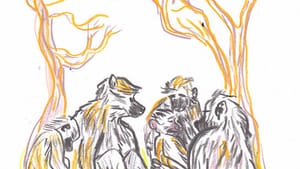Stay in the Loop
BSR publishes on a weekly schedule, with an email newsletter every Wednesday and Thursday morning. There’s no paywall, and subscribing is always free.
It's time for us to evolve
Humans going ape

It’s safe to say that my sense of déja vu when I learned about the mass shooting in Las Vegas was far from unique. The final numbers of dead and wounded hadn’t been tallied, but this one immediately sounded worse than the others.
Then again, does it matter how many people a lone shooter takes with him (always him, it seems) before he is inevitably either gunned down or kills himself? The sense of entitlement behind this sort of thing is the same, isn’t it? When you get to the very bottom of the human barrel, it’s splitting hairs to say who is worst.
There must be something we can do, argue proponents of new gun regulations (again). No new laws are needed, says the other side (again), we just need to enforce the ones we already have and be more aware of mental illness. According to a Billy Penn article, Philadelphia’s homicide statistics, though considerably lower than 10 years ago, show a 36 percent rise since 2015, mostly in poor neighborhoods. In Commissioner Richard Ross’s view, “deep poverty combined with lenient gun laws is just a terrible mix for us.”
If not guns, people say, then it will be knives, bombs, cars, or trucks, because people who want to kill will find a way. It’s true that other “developed” nations deal with occasional acts of violence; however, the United States is the leader when guns are the weapon of choice.
"Why are we so violent?"
Why are we so violent? Moreover, is it too late to do anything about it? In a nation founded on freedom of choice, where movies depicting bloodshed are okay for teens but movies depicting sex are unsuitable, with an anthem commemorating a battle and a bird of prey as its national symbol, can the ship be turned? Or is gun culture intractable?
Consider Stanford University biologist and neurologist Dr. Robert M. Sapolsky’s tale, first published in 2004, of the Kenyan baboon community of 62 he calls Forest Troop. Unlike Rafiki, Simba’s guru in Disney’s The Lion King, male baboons are notoriously combative and ill tempered, asserting dominance through force. Their aggressiveness goes beyond establishment of the alpha to include bullying the weak.

When they drove off another troop of baboons to claim a tourist lodge’s garbage dump, Forest Troop’s kingpins thought their brute strength granted them a treasure trove of easy pickings. Instead, they ate tainted meat and soon died of tuberculosis; overnight, the troop became predominantly female, with only weak or immature males left.
Ladies' choice
Male baboons aren’t given to such nurturing actions as grooming others, but once Forest Troop’s alphas disappeared, the survivors were held together by mutual displays of affection, instead of the usual intimidation. Even more surprising, new males who subsequently joined the troop adapted to its unusual culture, rather than returning to the baboon norm.
This is significant because only female baboons, who outlive their male counterparts by an average of seven years, remain in their troop throughout their lives; as soon as young males reach maturity, they move elsewhere. While there are no guarantees that Forest Troop’s peaceful ways will last forever, the uncharacteristic pattern seems to have stood the test of time.
According to Sapolsky, who is renowned for his studies on the subject of stress, even the lowest baboons on Forest Troop’s totem pole show relatively limited levels of tension when compared to animals of similar rank in more traditionally organized groups. Not surprising.
Of course, we aren’t baboons, and the likelihood of every bellicose member of the human race dying at the same time is slim. Then again, we aren’t baboons, which means we are (in theory) capable of higher reasoning. If baboons and rhesus monkeys — obnoxious little creatures who, in a study authored by Emory University’s Dr. Frans B.M. de Waal, learned to be more civil by osmosis when exposed to stump-tailed monkeys — can change their ways, why can’t humans adopt a kinder, gentler model?
If you just said kindness and gentleness are for the weak, you might be part of the problem.
Sign up for our newsletter
All of the week's new articles, all in one place. Sign up for the free weekly BSR newsletters, and don't miss a conversation.

 Maria Thompson Corley
Maria Thompson Corley
 Illustration by Hannah Kaplan
Illustration by Hannah Kaplan